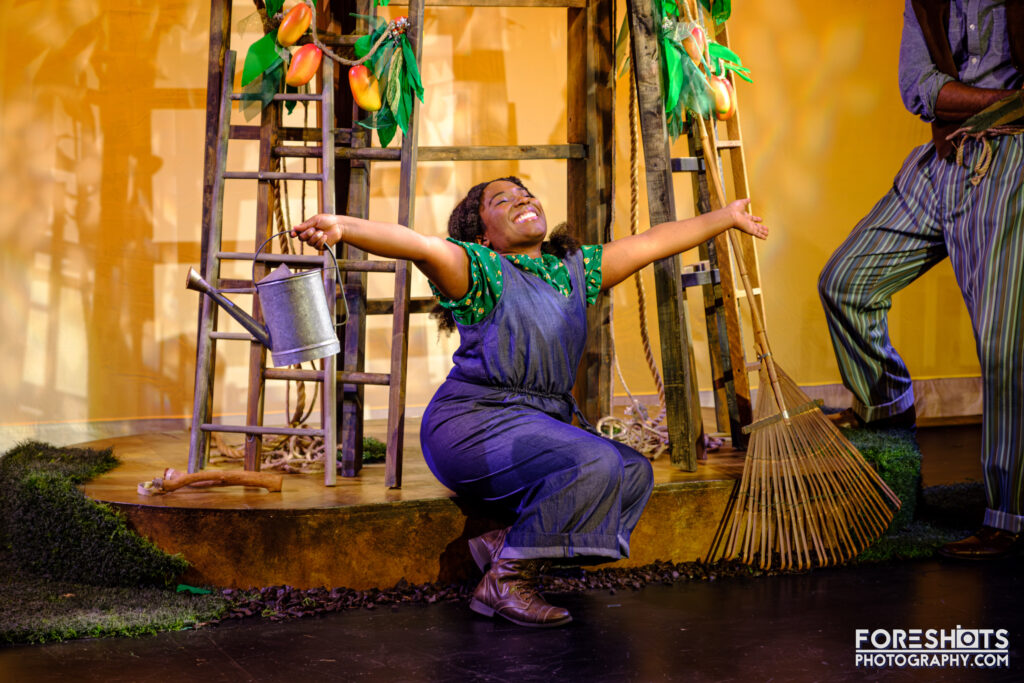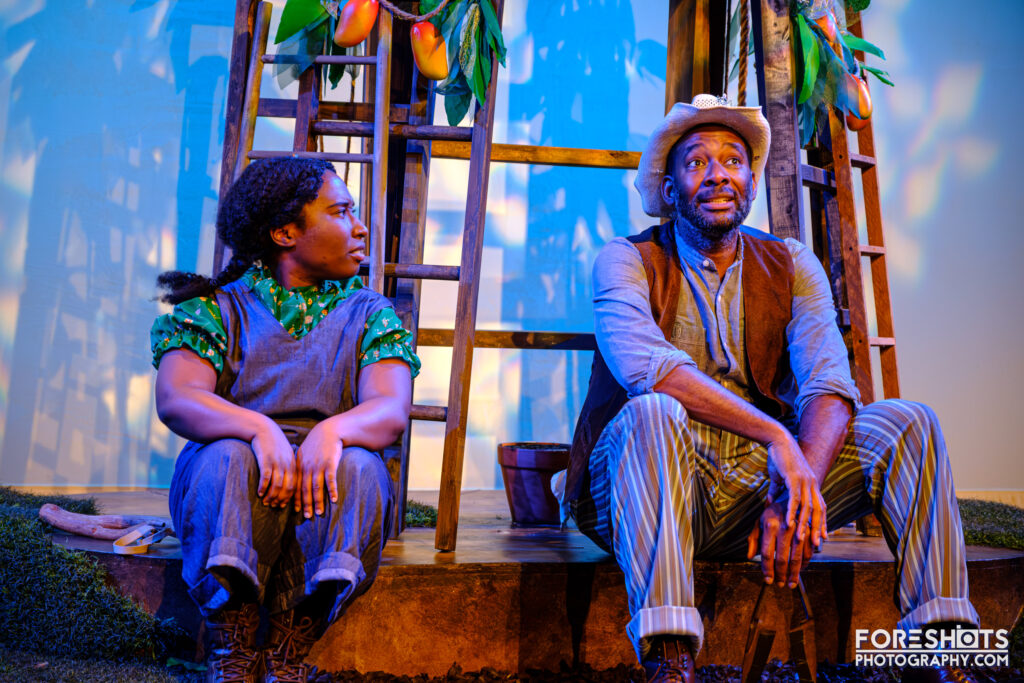

Sweeter is a darling of a show. Although the production is aimed at the younger crowd, older folks will also enjoy the whimsical journey.
This world premiere of Sweeter is Cahoots Theatre’s first foray into theatre for young audiences, supported by Roseneath Theatre, which has been producing family shows for 40 years. Sweeter is a genuine surprise for Cahoots’ followers because the formidable theatre is associated with mostly gritty plays representing the BIPOC community. Charming is not a word I would normally associate with Cahoots, but Sweeter has charm up the whazoo.
Playwright Alicia Richardson is a transplanted American, and Sweeter is set in her native Florida in 1887, when the town of Eatonville was founded by freed Black men, one of whom is the rich landowner Zucker (Sébastien Heins). Ralph (Daren A. Herbert), accompanied by his young daughter Sweet Pea (Alicia Plummer), has come from Tennessee in search of work. Over a handshake, Zucker and Ralph make an agreement to lease to buy. The man and his daughter are euphoric that one day, they will own the land on which they are currently labourers.
Zucker, Ralph and Sweet Pea are real people, but there are two other important characters in the play. Dee, the Sun (Uche Ama) dances her warmth over the land, always with a broad smile. And then there is the Mango Tree (Emerjade Simms) who is at the heart of the story.
Ralph and Sweet Pea are successful farmers because they listen to the land. On their travels south, they bought the Mango Tree from a farmer who didn’t know how to grow it, and wanted to get rid of it. Sweet Pea regards Tee, as the Mango Tree is called, as her best friend, and the two engage in lively conversations. It is a conflict over the sweet mango fruit of Tee, that causes the break between Zucker and Ralph. In fact, Zucker denies ever giving Ralph the option to buy the land, and claims ownership over the Mango Tree.
And thus, the story of Sweeter continues, but I’m not going to give anything more away. Suffice it to say, the plot is quite sophisticated, even a bit complex, but then, Richardson clearly did not want to condescend downward. She gives the audience, young and old, a lot to think about.
The acting is uniformly strong, and this is a cast of creds, beginning with the Dora Award-winning Herbert who does a lovely job as a father, but one beset by worries. He manages warmth with Sweet Pea, and a polite but diffident distance with Zucker, but when he needs to find his strength, it is there.
It’s always easier to play a villain than someone nice, and Heins has great fun being smarmy and supercilious by turn. Without ever raising his voice, he oils his way through the story causing mayhem in his wake. That the villain is a Black man, who causes harm to another Black man, makes an important statement.

Plummer happens to be a short actor, so portraying a child of ten is not a far-fetched thing. Her performance of the joyous and enthusiastic Sweet Pea is absolutely engaging, but also believable is her heartfelt sorrow when misadventure finds her. The warmth between Plummer, daughter, and Herbert, father, is palpable.
Simms has to perch on ladders as the Mango Tree, which is not an easy task, one leg crooked over a rung, but she manages beautifully. In terms of character, Simms projects an innocence that is disarming. As for Dee, the Sun, Ama exudes warmth, as well she should. Her character is, pardon the pun, always sunny. She also gets to sing and dance in delightful fashion.
Director Tanisha Taitt had a lot on her plate for this production. As stated before, there are dark aspects to the plot that could seriously weigh down the play. On the other hand, there are also many fun-filled moments. The task is to find the balance, and Taitt has managed to project the middle ground between dark and light. She has also worked on relationships, because they stand out – Sweet Pea and Ralph, Sweet Pea and Tee, Ralph and Zucker, and the Sun oblivious to everything.
What I also found so captivating about Sweeter is Sim Suzer’s adorable set. The main event is the character of the Mango Tree which is cleverly done through ladders and ropes. Actor Simms perches on the rung of a ladder, and as the tree grows, she goes higher. Also, as the tree matures, more ladders are added to the sides along with ropes bearing leaves and fruit. The effect is very hard to describe in words, but trust me when I say that the concept works.
There is also a flower box where one side of the earth contains dead flowers, and the other side, live ones. A sunny cyclorama, a picket fence, a hut and a mound of earth complete the picture. When you walk into the theatre, the set just gathers you up in its bright and light aura (furnished by lighting designer Shawn Henry).
A.W. Nadine Grant’s costumes are serious and whimsical by turn. Zucker is in a tailored suit, while Ralph and Sweet Pea sport overalls. The Mango Tee is in a black body suit, which is a smart idea. The Sun, however, is pure fancy, decked out in an old-fashioned, Victorian era, yellow dress dotted with lace. She also carries around a matching yellow parasol.
Props designer Amelia Blaine must have contributed the luscious-looking mango fruit, as well as a whole farm wagon load of vegetables. The actual mangos, given the story line, have to look juicy and succulent, and they do. As there is no composer listed, I’m assuming that sound designer Miquelon Rodriguez furnished the jovial music for the Sun in particular, and the play in general. There are also terrific storm effects, rendered by both sound and light.
Having a young, 10-year-old Black girl at the heart of the story is an important thing. As both the playwright and the director point out in their program notes, Black children in the audience will see themselves reflected on the stage. The play also touches on important themes such as family love, friendship, honesty, and caring for the land, among others. Thus Sweeter can take its place proudly among plays for young audiences with the hope that it will find a shelf life. It certainly deserves to.
There is, however, one niggling thought about Sweeter that I have, in fact, one that made me feel uncomfortable. Sweet Pea and Ralph rejoice at Zucker’s downfall, and that is perfectly understandable, but, as this is a play for young audiences, do we want to send the message of gloating over someone else’s misfortune, even though well deserved? Somehow I felt that father and daughter should have shown some compassion. It was the only down moment that Sweeter gave me.
